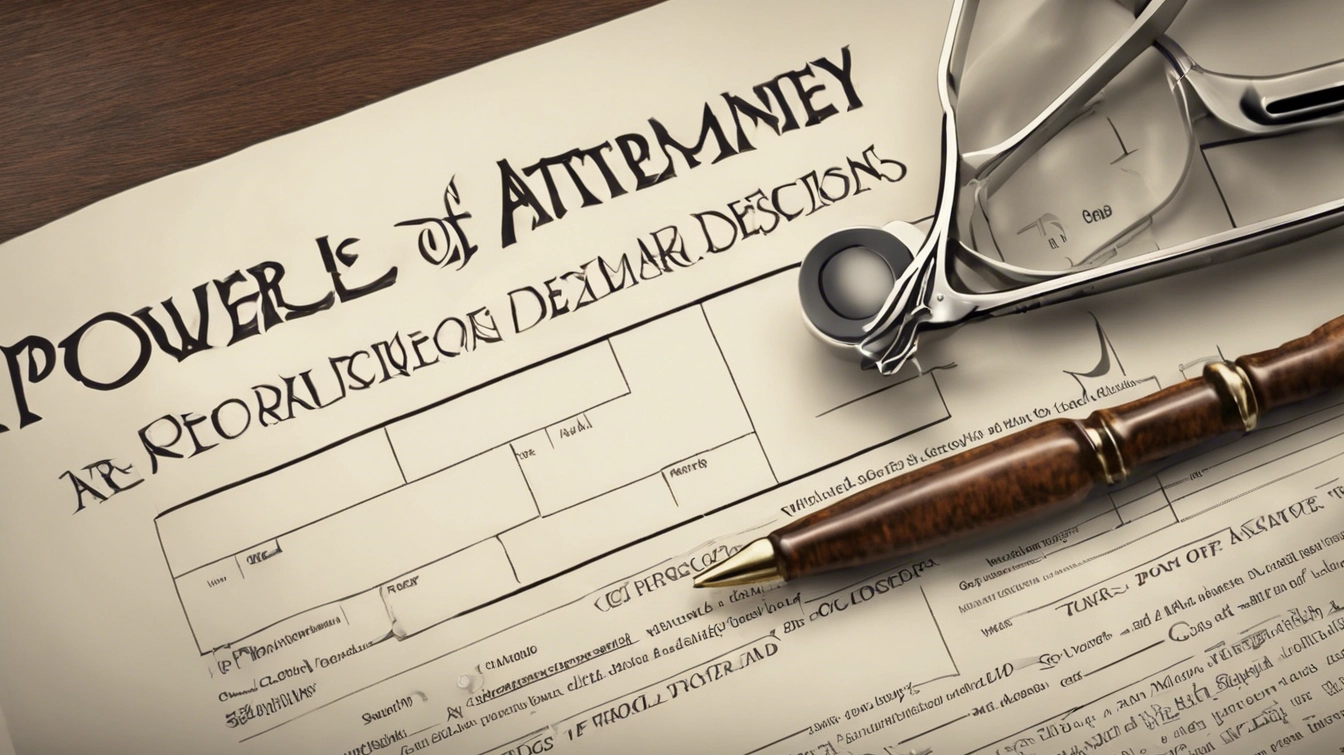The Importance of Power of Attorney in Estate Planning
In estate planning, a Power of Attorney (POA) is vital for managing your financial and healthcare decisions if you become incapacitated. Understanding what a POA entails and its role in your overall plan is key.
A Power of Attorney is a legal document that authorizes another person or entity to make decisions on your behalf. There are various types, each serving distinct purposes:
- General Power of Attorney: Grants broad authority to manage financial and legal affairs.
- Special Power of Attorney: Limits authority to specific tasks or decisions.
- Healthcare Power of Attorney: Also known as Medical POA, allows someone to make medical decisions if you’re unable to.
Choosing who will act as your POA requires careful consideration since they will have access to sensitive information and significant decision-making power. When drafting this document as part of your estate plan, seeking legal advice ensures it accurately reflects your intentions.
Roles and Duties of a Power Of Attorney in Estate Planning
The responsibilities entrusted to a POA are critical in maintaining order when an individual cannot make their own decisions. Key duties include:
- Financial Oversight: Handling bills, managing investments, protecting assets.
- Medical Decisions: Making healthcare choices based on directives.
- Property Management: Managing real estate transactions like renting or selling properties.
Additionally, the appointed person must act ethically by keeping accurate records and separating their finances from those they manage. By fulfilling these roles responsibly, they ensure that the individual’s wishes are honored.
Selecting The Right Person For Your Power Of Attorney
Choosing who will serve as your power of attorney involves several considerations:
- Trustworthiness: The chosen individual should be someone you trust implicitly since they’ll have control over important aspects of your life.
- Aptitude In Financial And Legal Matters: Select someone financially responsible with an understanding of these areas because they’ll handle asset management and other related tasks.
- Acknowledgment Of Healthcare Preferences: If appointing a medical POA, ensure they respect and understand your health care preferences so they’re aligned with what you want done medically if needed.
- Communication Skills: Effective communication skills are necessary so that all parties involved remain informed about any actions taken. This includes family members, health care providers, etc.
Establishing A Comprehensive POA In Your Estate Plan
When creating an inclusive power of attorney within your overall plan, consider:
- Choose A Reliable Agent: Select someone trustworthy who’ll act according to your best interests while carrying out the instructions you gave.
- Specific Instructions: Clearly outline preferences, providing detailed guidance regarding medical care, finances, and other things.
- Contingency Planning: Consider naming alternate agents just in case the primary choice can’t fulfill duties assigned to them.
- Periodic Review: Periodically review and update documents, ensuring current circumstances are reflected accurately within them.
By addressing these factors and working alongside qualified professionals, you can establish a comprehensive POA, giving peace of mind, knowing affairs are managed according to preferences even when unable to do so personally.

Understanding Power of Attorney
A Power of Attorney is a legal document that allows you to appoint someone to make decisions on your behalf. This person, known as your “agent” or “attorney-in-fact,” gains the authority to handle a wide range of tasks based on the specified terms.
Types of Power of Attorney
| Type | Description |
|---|---|
| General POA | Grants broad powers to manage your affairs while you’re still alive but often becomes invalid if you become incapacitated. |
| Durable POA | Continues to be effective even if you become incapacitated. |
| Special/Limited POA | Grants authority for specific tasks or for a limited period. |
| Springing POA | Becomes effective only under certain conditions, usually incapacitation. |
Benefits of Incorporating Power of Attorney in Estate Planning
Incorporating a Power of Attorney into your estate plan can yield numerous advantages:
1. Immediate Decision-Making Power
In the event of incapacity, your designated agent can swiftly step in to make crucial decisions. This ensures that your financial and medical needs are addressed without lengthy court proceedings.
2. Financial Management
Your agent can manage your assets, pay bills, file taxes, and even make investment decisions. This prevents any disruption in your financial affairs.
3. Health Care Decisions
A Healthcare POA can be established to allow your agent to make medical decisions on your behalf, ensuring that your treatment preferences are followed.
4. Legal Safeguards
Using a POA adds a layer of protection against potential fraud or unauthorized management of your assets. You can specify limits and conditions to safeguard your estate further.
How to Effectively Implement a Power of Attorney
Consult an Attorney
It’s crucial to consult with an estate planning attorney when drafting a POA. They can provide guidance on the most suitable type of POA for your needs and help to outline specific terms and conditions.
Choose a Trustworthy Agent
Select someone you trust implicitly. This person should be responsible, financially savvy, and ideally have some experience in managing financial or healthcare matters.
Regular Updates
As life circumstances change, it’s wise to review and, if necessary, update your POA to reflect your current wishes and the best person for the job.
Practical Tips for Managing a Power of Attorney
- Keep it accessible: Make sure the original document is stored safely, but accessible to your agent.
- Inform relevant parties: Notify banks, healthcare providers, and other key contacts about the POA.
- Review state laws: Regulations governing POAs can vary by state, so ensure your document complies with local laws.
Case Studies: Real-Life Uses of Power of Attorney
Case Study 1: Managing a Parent’s Finances
John’s mother, who has Alzheimer’s, appointed him as her agent via a Durable POA. This allowed John to handle all her financial affairs seamlessly, including paying her bills and managing her investments, without needing court intervention.
Case Study 2: Healthcare Decisions
Lisa appointed her sister as her Healthcare POA. When Lisa needed surgery but was temporarily incapacitated, her sister was able to make informed decisions that followed Lisa’s healthcare preferences precisely.
Common Misconceptions about Power of Attorney
There are several myths and misconceptions surrounding POAs. Let’s debunk a few:
Myth 1: POA Gives Total Control
Many people think a POA gives the agent unrestricted control over all aspects of their life. In reality, the powers granted can be as broad or as limited as specified in the document.
Myth 2: Only for the Wealthy
Contrary to popular belief, anyone can benefit from a POA, regardless of their net worth. It’s a protective measure for individuals of all financial situations.
Myth 3: Permanent and Unchangeable
A POA is not set in stone. You can revoke or modify it as long as you are mentally competent, granting flexibility to adapt to life changes.
First-Hand Experience: Testimonials from Individuals Who Used POA
Jane’s Experience: Preventing Financial Ruin
“Having a POA in place saved us during my husband’s illness. He appointed me as his agent and, when he became incapacitated, I could immediately take over our financial matters without the need to go through court. It truly prevented a financial disaster.” – Jane D.
Robert’s Take: Peace of Mind
“When my father had a stroke, I was glad we had set up a Healthcare POA. I could make decisions aligned with his wishes without feeling lost or overwhelmed. It provided our family significant peace of mind.” – Robert T.


